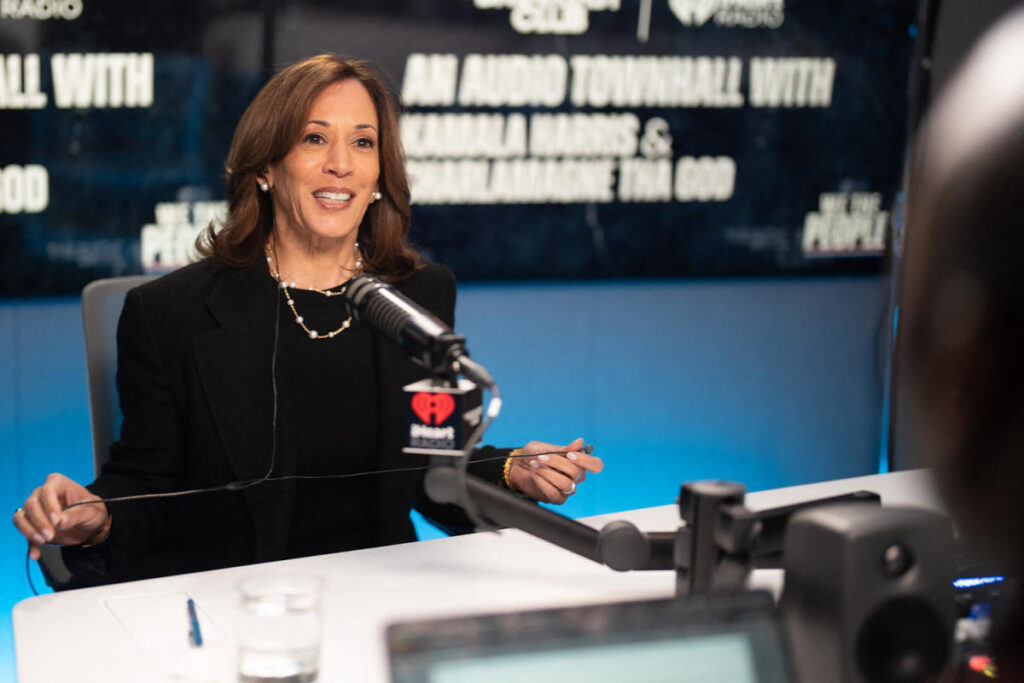In a recent live radio town hall hosted by Charlamagne Tha God in Detroit, Vice President Kamala Harris aimed to bolster her connection with Black voters by discussing key issues and responding to the criticisms directed at the Democratic Party. During the session, Harris faced challenging questions regarding Black voters feeling neglected by Democrats despite their unwavering support. Acknowledging the historical context of systemic disparities, she emphasized that she must earn every vote while highlighting her roots in the Black community, both through her upbringing in Oakland and education at Howard University. She also recognized the importance of maintaining Black voter support, especially as some polling indicated a slight downturn in backing for Democrats among voters of color.
Harris also utilized the platform to critique former President Donald Trump, drawing attention to a report indicating Trump sent Covid testing devices to Russia when Americans, particularly Black communities, were struggling to access them. While the specific claims in the report remain unverified, Harris highlighted the impact of the pandemic on Black Americans, recalling how many families faced deep losses during that time. In her argument, she painted Trump as a candidate who sought approval from authoritarian leaders rather than focusing on the needs of American citizens, especially during a public health crisis that disproportionately affected marginalized communities. Her pointed rhetoric aimed to frame Trump’s actions as weak and unpatriotic, underscoring her administration’s commitment to addressing inequality.
Harris’s discussions also touched on the contentious topic of slavery reparations, a stance she initially embraced during her 2019 presidential campaign. When asked about reparations, she asserted that the concept requires careful study and reiterated her commitment to understanding historical injustices that have lasting impacts on contemporary African American communities. As a former senator, her support for a bill aimed at creating a federal commission to study reparations was highlighted, signaling her intent to confront long-standing issues of racial inequality. Despite the historical criticisms she has faced regarding her prosecutorial record, particularly concerning drug charges that disproportionately affected Black men, Harris sought to clarify her goals related to criminal justice reform and advocating for the decriminalization of marijuana.
Trump’s campaign quickly responded to Harris’s remarks, emphasizing survey data that indicates a significant number of Black voters believe the country is heading in the wrong direction. They also took the opportunity to criticize her proposal for reparations, suggesting that such policies could impose heavy financial burdens on the U.S. economy. A statement from Trump’s Black media director criticized Harris for placing Black Americans last in political priorities, implicitly questioning the Democrats’ dedication to addressing the concerns of Black voters. This dynamic reveals the ongoing tension between the two parties as they vie for support from crucial voting blocs.
The interview format underscored the complex relationship Harris shares with Charlamagne Tha God, who has both supported and critiqued her in the past. His sharp questioning reflected ongoing concerns among some voters regarding Harris’s positions and actions, including a prior controversial stance on gender-affirming care for incarcerated individuals that her campaign has since downplayed. Discussions surrounding her cautious communication style and adherence to talking points further revealed the challenges she faces in connecting authentically with the electorate while appealing to a broad range of voters.
Despite these challenges, Harris expressed a level of self-assuredness, stating that she views the upcoming election as a close campaign where she remains determined to win. Her comments about repetition in her messaging as a strategy to engage with distracted audiences showcased her approach to voter outreach. Additionally, in a lighter segment, Harris demonstrated her ability to engage with humor, expressing approval for Maya Rudolph’s comedic portrayal of her on “Saturday Night Live.” This duality—balancing serious discussions about race, policy, and identity with moments of levity—reflects Harris’s nuanced position as she prepares for a potentially pivotal election season.
In conclusion, Vice President Kamala Harris used her appearance on Charlamagne Tha God’s radio show to address key issues affecting Black voters while responding to criticism surrounding her party’s support. With her strong focus on reparations, criticism of Donald Trump, and acknowledgment of her past as a prosecutor, Harris aimed to reaffirm her commitment to equity and justice. As her campaign encounters challenges, particularly in maintaining support from communities of color, her ability to navigate complex conversations will likely prove even more vital as the election approaches. Ultimately, her proactive engagement with voters reflects both her leadership ambitions and the significance of the upcoming electoral battle within the context of American racial politics.

